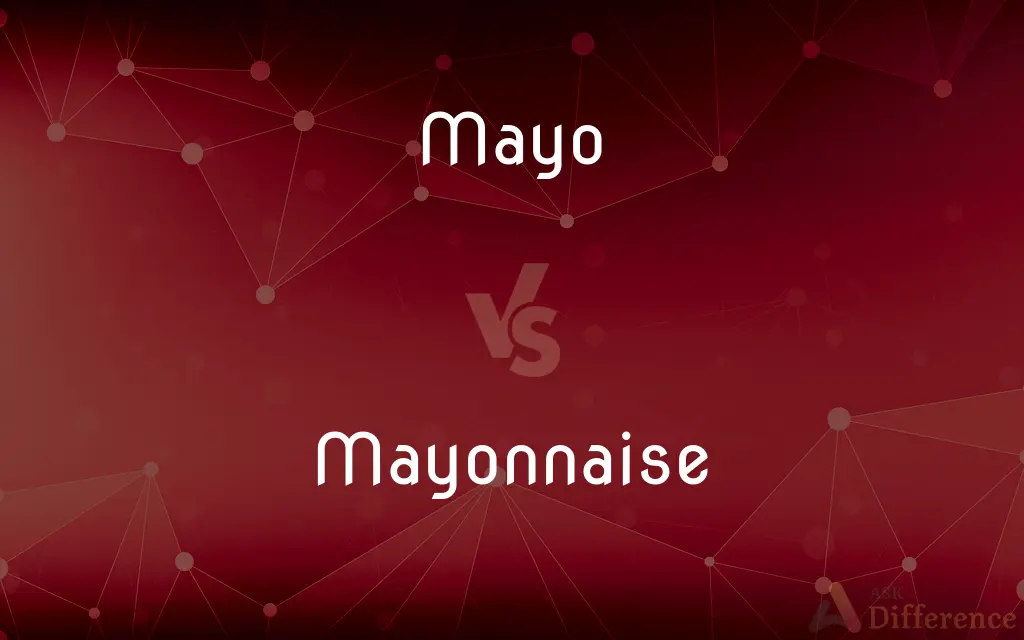Mayo vs. Mayonnaise — What's the Difference?
By Urooj Arif & Fiza Rafique — Updated on March 7, 2024
Mayo is a common abbreviation for mayonnaise, both referring to a creamy, thick sauce made from oil, egg yolk, and vinegar or lemon juice. The main difference lies in formal vs. casual usage.

Difference Between Mayo and Mayonnaise
Table of Contents
ADVERTISEMENT
Key Differences
Mayo and mayonnaise are essentially the same product, with "mayo" being the informal, shortened form of the word. While both are widely recognized and used interchangeably in various contexts, "mayo" is more commonly used in casual speech and text.
Mayonnaise is known for its rich, creamy texture and is used as a condiment and base in many dishes. On the other hand, when people refer to "mayo," they are often implying the same uses but might be referring to it in a more informal setting, such as at home or in casual dining.
The preparation of mayonnaise involves emulsifying oil with egg yolks and acid, like vinegar or lemon juice. Whereas the term "mayo" doesn't imply any difference in preparation, it suggests a less formal approach to discussing the same emulsion.
In culinary discussions or formal writing, "mayonnaise" is the preferred term, ensuring clarity and formality. Conversely, "mayo" is favored in quick, informal exchanges or on menus where space is limited and a casual tone is appropriate.
Despite the difference in connotation, there is no variation in the product itself when comparing mayo to mayonnaise. Both terms describe the same condiment, used globally to enhance the flavor of various dishes.
ADVERTISEMENT
Comparison Chart
Formality
Informal
Formal
Usage Context
Casual conversations, quick text, menus
Formal writing, culinary discussions
Length of Term
Short
Full
Implication
Casual, everyday use
Traditional, detailed description
Variations
Implies simplicity and quick reference
Indicates a comprehensive view or recipe specification
Compare with Definitions
Mayo
Used in various dishes for added flavor.
This recipe calls for two tablespoons of mayo.
Mayonnaise
A stable emulsion of oil, egg yolk, and an acid.
Mayonnaise forms the base of this salad dressing.
Mayo
Often used in fast food and casual dining.
They slather a lot of mayo on burgers.
Mayonnaise
A condiment used worldwide.
Mayonnaise is a key ingredient in many sauces.
Mayo
A thick, creamy sauce used as a spread.
I love adding extra mayo to my sandwiches.
Mayonnaise
Has a rich, creamy texture.
The mayonnaise adds a creamy texture to the sandwich.
Mayo
An informal term for mayonnaise.
Can you pass the mayo, please?
Mayonnaise
Can be flavored in various ways.
I prefer garlic mayonnaise with fries.
Mayo
Can be homemade or store-bought.
Homemade mayo tastes fresher than the jarred kind.
Mayonnaise
Requires precise mixing to emulsify.
Making mayonnaise requires slowly adding oil to egg yolks.
Mayo
Mayonnaise.
Mayonnaise
Mayonnaise, informally mayo, is a thick cold sauce or dressing commonly used in sandwiches, hamburgers, composed salads, and on French fries. It also forms the base for many other sauces, such as tartar sauce, fry sauce, remoulade, salsa golf and rouille.Mayonnaise is an emulsion of oil, egg yolk, and an acid, either vinegar or lemon juice; there are many variants using additional flavorings.
Mayo
Clipping of mayonnaise
Pass me the mayo please.
Mayonnaise
A thick dressing made of beaten raw egg yolk, oil, lemon juice or vinegar, and seasonings.
Mayo
A white person.
Mayonnaise
A dressing made from vegetable oil, raw egg yolks, vinegar or lemon juice, and seasoning, used on salads, with french fries, in sandwiches etc.
Mayo
Egg yolks and oil and vinegar
Mayonnaise
Any cold dish with that dressing as an ingredient.
We served a lobster mayonnaise as a starter.
Hair mayonnaise
Facial mayonnaise
Mayonnaise
(transitive) To cover or season with mayonnaise.
Mayonnaise
A thick white sauce compounded of raw yolks of eggs beaten up with olive oil to the consistency near to that of a gel, and seasoned with vinegar, pepper, salt, etc.; - used in dressing salads, fish, etc. Also, a dish dressed with this sauce.
Mayonnaise
Egg yolks and oil and vinegar
Common Curiosities
How is mayonnaise made?
Mayonnaise is made by emulsifying oil with egg yolks and vinegar or lemon juice, often seasoned with salt, mustard, and other spices.
Can mayo and mayonnaise be used interchangeably?
Yes, mayo and mayonnaise can be used interchangeably, as they refer to the same product.
Is mayo less formal than mayonnaise?
Yes, "mayo" is considered a more informal term compared to "mayonnaise."
Does mayonnaise contain dairy?
No, traditional mayonnaise does not contain dairy; it's made from oil, egg yolks, and acid.
Can I make mayo at home?
Yes, you can make mayo at home by emulsifying oil, egg yolk, and acid.
What is mayo?
Mayo is an informal term for mayonnaise, a creamy condiment made from oil, egg yolk, and acid.
Is there a difference in taste between mayo and mayonnaise?
No, there is no difference in taste; the terms refer to the same condiment.
Is mayonnaise only used in sandwiches?
No, mayonnaise can be used in a variety of dishes, including salads, sauces, and dressings.
Is mayo unhealthy?
Mayo is high in calories and fat, so it should be consumed in moderation as part of a balanced diet.
Can mayo be vegan?
Yes, vegan mayo substitutes egg with plant-based ingredients.
What are some common uses for mayo?
Mayo is commonly used as a spread, in dressings, salads, sandwiches, and as a base for other sauces.
Are there different types of mayonnaise?
Yes, there are many variations, including flavored mayonnaises and lighter versions with reduced fat and calories.
How long does homemade mayonnaise last?
Homemade mayonnaise can last up to one week in the refrigerator.
Does mayonnaise need to be refrigerated?
Yes, after opening, mayonnaise should be refrigerated to maintain its quality.
Can I freeze mayonnaise?
Freezing mayonnaise is not recommended, as it can separate and affect the texture.
Share Your Discovery

Previous Comparison
Overpass vs. Flyover
Next Comparison
Gorgeous vs. BeautifulAuthor Spotlight
Written by
Urooj ArifUrooj is a skilled content writer at Ask Difference, known for her exceptional ability to simplify complex topics into engaging and informative content. With a passion for research and a flair for clear, concise writing, she consistently delivers articles that resonate with our diverse audience.
Co-written by
Fiza RafiqueFiza Rafique is a skilled content writer at AskDifference.com, where she meticulously refines and enhances written pieces. Drawing from her vast editorial expertise, Fiza ensures clarity, accuracy, and precision in every article. Passionate about language, she continually seeks to elevate the quality of content for readers worldwide.















































